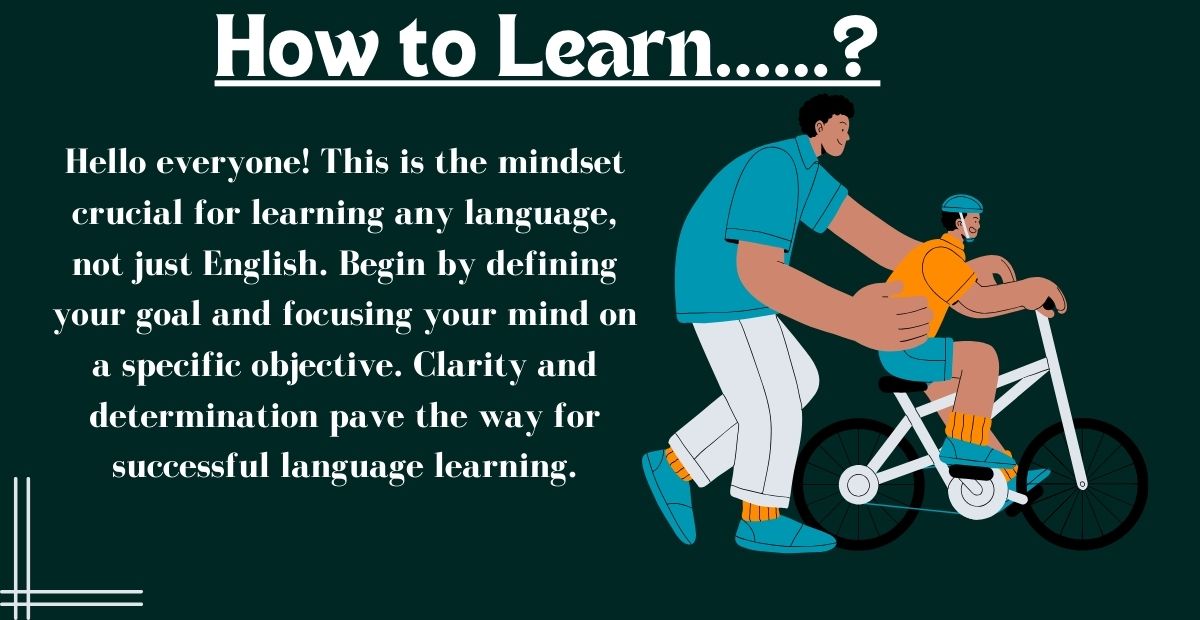Introduction
(Growth Mindset for Learning English Easily & Confidently)
Do you ever feel stuck memorizing grammar rules, only to forget them later? The truth is, learning English isn’t just about textbooks or practice—it’s about your mindset. A positive, growth-oriented mindset can make English learning easier, faster, and more enjoyable.
In this article, we’ll explore:
• What a growth mindset really means
• Why it’s so important for English learners
• Practical tips to develop this mindset
• Common challenges and how to overcome them
• How you can use this mindset every day to grow in English
"Your path to English fluency starts with the right mindset — a growth mindset."

What Is a Growth Mindset?
The term “growth mindset” was made popular by psychologist Carol Dweck. A growth mindset is the belief that your abilities and intelligence can be developed through effort, strategies, and help from others.
When applied to English learning, it means:
• You believe that your English can improve with practice.
• You see mistakes as stepping stones, not roadblocks.
• You focus on progress, not perfection.
For example:
• Fixed mindset: “I’m bad at speaking English. I can’t do it.”
• Growth mindset: “Speaking English is hard now, but with daily practice, I’ll get better.”
This small change in thinking makes a huge difference in motivation and confidence.
Why Growth Mindset Matters in Learning English?
(Growth Mindset for Learning English Easily & Confidently) English is a global language, and millions of learners face the same challenges you do—fear of mistakes, difficulty understanding accents, or trouble remembering vocabulary.
If you have a fixed mindset, these problems feel like permanent walls. But with a growth mindset, you see them as temporary challenges you can climb over.
Benefits of Growth Mindset for English Learners:
1. Motivation stays high – You don’t quit when you face difficulties.
2. Less fear of mistakes – You treat errors as lessons, not failures.
3. More practice opportunities – You try speaking, writing, and reading without worrying about being perfect.
4. Faster improvement – Consistency brings steady progress.
5. More enjoyment – Learning feels exciting, not stressful.
Imagine two learners:
• Learner A thinks: “I’m not good at English, so why try?”
• Learner B thinks: “I’m not good yet, but I’ll get there.”
After six months, Learner A has stopped practicing. Learner B, even with mistakes, has improved a lot. The difference is not talent—it’s mindset.
Growth vs. Fixed Mindset in English Learning
Fixed Mindset
“I will never speak English fluently.”
“Mistakes mean I’m not smart.”
“Only some people are good at languages.”
“I failed once, so I’ll always fail.”
Growth Mindset
“Fluency takes time, and I can get there step by step.”
“Mistakes are proof that I’m learning.”
“Anyone can improve with consistent practice.”
“Failure is feedback. I can try again differently.”
This table shows how a small shift in thinking can open new doors in your English learning journey.
Practical Tips to Build a Growth Mindset for English
So, how can you train your brain to think in a growth-oriented way? Here are some proven strategies:
1. Celebrate Small Wins
Learning 5 new words in a day, finishing a short story, or even speaking one sentence correctly is a win. Small victories build big confidence.
2. Embrace Mistakes
Instead of feeling embarrassed, ask: “What can I learn from this mistake?” Every error is a teacher.
3. Practice Daily
Consistency matters more than intensity. Even 15 minutes a day can create big results over months.
4. Use Positive Self-Talk
Change your inner dialogue. Replace “I can’t” with “I’m learning.” Your words shape your mindset.
5. Surround Yourself with English
Watch movies, listen to podcasts, join online groups. The more you surround yourself with English, the more confident you become.
6. Track Your Progress
Keep a journal of new words, phrases, or improvements. Looking back will remind you how much you’ve grown.
Common Challenges and How to Overcome Them
Even with a growth mindset, learners face struggles. Let’s address some common ones:
1. Fear of Speaking English
• Problem: You’re afraid people will laugh or not understand.
• Solution: Start small—greet someone, order food, or talk to yourself. Gradually build up.
2. Lack of Confidence
• Problem: You compare yourself with advanced learners.
• Solution: Compare yourself only with your past self. Notice your progress.
3. Slow Improvement
• Problem: You feel progress is too slow.
• Solution: Understand that language learning is a marathon, not a sprint. Consistency is key.
4. Negative Thinking
• Problem: “I’ll never be fluent.”
• Solution: Challenge this thought. Replace it with: “I’m not fluent yet, but I’m getting closer.”
Real-Life Example
Think of a child learning to walk. They fall many times, but never stop trying. Each fall is progress, not failure. If a baby had a fixed mindset, no one would ever walk! Learning English is the same—you stumble, but each stumble is proof that you’re moving forward.
FAQ – Growth Mindset for English








Conclusion: Keep Growing in English
A growth mindset is the secret weapon in your English learning journey. It turns mistakes into teachers, failures into opportunities, and challenges into stepping stones.
Remember:
• You don’t need to be perfect. You just need to keep going.
• You don’t need to compare with others. Compare only with your past self.
• You don’t need to learn overnight. Step by step is enough.

